Author Archive
Why did I delete your answer?
Imagine someone has a question about physics, say “How can I figure out the acceleration due to gravity?”
A physicist answers with “You can throw a bowling ball from various floors of a multistorey building.” The physicist knows in their head the experiment they would perform. It’s so obvious to them that they skim over the details and say what they see to be the key points, and assume that the person asking will figure the rest out.
The problem with this is that a non-physicist has asked the question, and they don’t know the details that the physicist skimmed over. If they did, they maybe wouldn’t have to ask the question. Thus, the person asking the question is little better off than they were before asking.
Now imagine this is a single word request:
Word for staring wide-eyed at a TV
I saw my son staring wide-eyed at the television. His face looked so comical to me. Is there a word to describe such wide-eyed staring?
I’d like to use it like “My son was staring at the TV last night, it was so funny to see.”, but I don’t like staring because it doesn’t emphasise his wide-eyed-ness.
Is there a word that would better describe what I mean?
And then there is the answer:
I think you’re looking for goggling.
Now you and I know that is a good word for the situation, but is it a helpful answer?
If you’re wondering, then let me tell you: it’s not. The Stack Exchange system itself will parse it and flag it as “low quality” and it will garner a comment from a moderator or other concerned member and then, if no improvements are made after a week or so, it will be deleted.
Yes, the asker now has a word to fill their gap, but the answer does not explain why goggling is fit for the purpose. The asker has no context to decide if this answer is the best fit, and no way to generalize the word to fit other situations.
Why is that important? The thing to remember is that the person who came here looking for an answer is unlikely to already know the answer. You don’t get many people who go around wondering “how many people know the word goggling?” (And I suspect most of those who do are crossword designers.)
If someone doesn’t already know the answer, then the details are important. When you suggest a word for a given context, you need to explain why it fits the context so that when they try and use it in the future they have a grasp on how the word works and what its connotations are.
I know many of you might complain that they should look it up in a dictionary. We’re a site for serious English language enthusiasts, after all.
That is irrelevant. An answer needs to be complete.
However, to entertain that idea for a moment. Most of our users are not serious enthusiasts. Most people come here looking for an answer and leave with one, without ever posting anything. That is the beauty of Stack Exchange.
That is why it is so important to leave a complete answer. With only half an answer, people will only half understand how to use a word.
So what does a better answer look like?
I think you’re looking for goggling. It’s from the verb *to goggle*, which means to stare at something with your eyes wide open and an amazed look on your face.
Instantly this answer is a lot more helpful. By adding a definition the answer now gives a clear explanation why the word is suitable. Also note that the definition isn’t from a reference. When giving the explanation a reference can be useful, but if you have your own way to articulate the meaning, then that is fine, too.
If you do use a reference it is essential to cite your source. If you copy and paste without citing your source the answer will be deleted as plagiarism. With a reference the answer would be:
I think you’re looking for goggling. From ODO, to goggle means:Look with wide open eyes, typically in amazement
The important points to remember:
- You are writing an answer for someone who doesn’t know anything about the word you’re suggesting.
- An answer needs to explain the word in order for it to be useful.
- If you are copy/pasting a definition you must cite where you got it from.
Good things from 2014
Now that hat season is in full swing, we thought it would be nice to have a look at some of the good bits of 2014 at English Language & Usage.
First of all, some congratulations to members who hit 20K reputation this year:*
- Marthaª
- Jon Hanna
- Mr Hen
- Yoichi Oishi
- TimLymington
- medica
- kris
- Josh61
- mplungjan
- Mari-Lou A
- Edwin Ashworth
- Sven Yargs
- ermanen
- choster
Job well done.
On a similar note, some of the more interesting gold badges earned this year:
Socratic
Unsung Hero
Marshal
Three questions from this year that caught our attention (in a good way)
- Why did /x/ change to /f/ in English? The question exposes an interesting shift in English pronunciation and has an answer that gives a nice explanation for how the change took place and shows where the sound still exists in other languages.
- Who originated “Merry Christmas”? A nice topical question for the time of year. It opens with a potted history of the phrase, and the answer takes us the rest of the way with some interesting tidbits.
- Is there a general rule for which types of nouns end in -archy vs. -cracy? While the question body is somewhat lack-lustre, the most upvoted answer is insightful giving a helpful comparison of the two suffixes.
Thanks to all our members for helping make EL&U the thriving community that it is. Thanks for an enjoyable 2014 and have a happy 2015!
*Thanks to the SE team for compiling the list. Since this was done in the middle of December more folks may have passed the line.
Chat vs Comment
Hello my friend! How are you doing? It is good to see you around these parts, the Stack Exchange network is a lovely part of the Internet where we can all help each other to learn.
Of course, though, there are rules by which we should abide if we want to keep this place friendly and free of noise. Hey, now, do not look like that. It is true there are many rules, but they are normally quite useful.
Today I want to tell you about how to communicate with your fellow Stack Exchange users. For example: you have seen something someone has written and you disagree. You are a polite person, so you do not think you should just downvote and leave. I admire your style. Communication is good. At Stack Exchange we are allowed to make comments on people’s posts to ask for clarification and to point out mistakes. Obviously we do this in as friendly a way as possible.
Oh? You cannot comment? I see, I see. Do not be troubled. Comments are a privilege, which is earned by attaining 50 reputation points on this site. It is a mere trifle. You will find that by contributing good quality answers and questions you will be there in a few days, maybe even less.
It is important to note that comments are not permanent parts of the site and they get deleted when they outlive their usefulness. Ideally the useful information in a comment will be integrated into the post the comment is on, thus making the comment redundant.
Also, you should understand that the main site is not for discussion. Comments should not be used to discuss a topic at length.
Yes, you are quite right. Sometimes discussion is useful, or necessary. For that there is another place! It is a wonderful place, really. There is much adventure to be had. We call this place chat. The ability to chat is also a privilege, but it has a lower bar. Only 20 reputation points are required.
Chat is used for discussion, yes, but the discussion can roam from being purely about topics on the main site. Many times people wander in with simple questions, questions that might not be suitable for the main site, and ask them in the chat room. This is fine, encouraged even. There is of course a lot of other discussion going on there too, it can get quite frenetic, but do not be afraid to jump in. Be courteous and not pushy and you will be fine.
One excellent trick you can do with chat is to take a discussion in comments and move it to a chat room. This is useful if you think the discussion will become long. Also, if you would like to chat with someone, but they and you are finding the main room too difficult, you can create your own room. The new room will be public, but people generally do not stray from the main room unless they are invited.
Well, my friend, I hope you stay a while. There is a lot you can learn, and maybe a lot you can teach! We will be glad to hear from you.
Book Review – The Adventure of English
The Adventure of English
The Biography of a Language
by Melvyn Bragg
While I am a serious enthusiast when it comes to learning about and understanding my native tongue, I am an amateur with regards to my studies. The work, carried out by Melvyn Bragg in writing this book, puts anything I do far in the shade. Despite this, he opens the book explaining that he is an amateur standing on the shoulders of linguistic scholars. This is made clear if one peruses the bibliography at the end of the book.
The book proper truly is an adventure story. After the introduction, as at the start of a Hollywood blockbuster, the narrative thrusts us into the heat of battle: barbarians, Romans and Celts fighting for survival and supremacy on this fair isle (Britain—if I’m unclear). However our hero is no legatus or chieftain. No, we are following the life of something far more interesting than any individual: the English language.
The treatment of English as a character is a clever hook that keeps the book interesting by allowing the reader to sympathise with the language as if it were a person. Bragg put me on the edge of my seat at many points through out the tale. How would English survive the Norman invasion? French, with a knife at its throat. What would become of the English champions who tried to bring the Bible to the masses? Despite its progenitor’s best attempts, how English helped slaves overcome their masters on more than one occasion. Bragg gives a good feel to the language, making it seem fluid and adaptable yet strong and persistent.
Each chapter tells the story of a different turning point in the history of English. This has the added bonus of meaning that the chapters don’t have to be read in order, since they are mostly self contained.
This is a book that loves the English language. Despite what the British have done, and Bragg chastises us where appropriate, English is always held as either a helping hand to the oppressed (as well as a tool of the oppressors) or as a means by which the good can triumph. It is better than French and Spanish, and more successful than any other language it encounters. Even in near defeat by the Normans, Bragg describes the English language’s revival as if the vocabulary it picked up were just a few scratches, so the language is essentially the same as it had always been.
The story shows us the experiences of people from all walks of life, from royalty to scholars, from merchants to explorers, from conquerors to slaves, and beyond. We are treated to excerpts from plays, poetry and myths, as well as the drier dictionaries and legislation. Every type of English has a part to play in its history.
I thoroughly recommend this book for lovers of history and language. It is not a deep scholarly work, insofar as it covers so much so it cannot be detailed about everything and it will have to miss some things out. Regardless, it is a very informative and entertaining book for anyone, especially those looking to start understanding the history of English.
Available at Amazon and Blackwells.
The Basics of Limerick Composition
It is difficult to judge someone’s language proficiency. There are plenty of standardised tests, but in my humble opinion, they just prove someone can pass a test, not how good they are at using a language.
Two things that can indicate a good grasp of a language, at least in the case of English, are the abilities to pun and to rhyme.
Punning is probably more difficult than rhyming, since it requires not only a good grasp of pronunciation and a swift vocabulary, but also knowledge of the meaning of a great many words and idioms.
One of my favourite British pastimes that involves a lot of rhyming and occasional punning, is that of writing limericks. I won’t be concentrating on puns, since they are not essential to limericks.
I can see you’re all wondering what this wondrous thing, a limerick, is. Limericks are a type of verse, invented as a parlour game. They follow a simple pattern:
- They have five lines.
- The last words of the first, second and fifth lines must have the same rhyme.
- The last words of the third and fourth lines must have the same rhyme.
- The first, second and fifth lines have the syllable stress pattern of duh DA duh duh DA duh duh daaa (approximately).
- The third and fourth lines have the syllable stress pattern of duh duh DA duh duh DA (approximately).
I say that they have five lines, but often limericks are written with the third and fourth lines combined into one. It is simpler to learn how to write limericks by thinking of them as having five lines. The stress patterns should be adhered to as well as possible, but can be fudged somewhat in order to include a rhyme. The only strict rule is the rhyming pattern of AABBA.
I think an example will be most illustrative. One of the great British poets, Edward Lear, was famous for his limericks. Here is an example:
There was an old man who said, ‘See!
I have found the most beautiful bee!’
When they said, ‘Does it buzz?’
he answered, ‘It does,
I never beheld such a bee!’
You can often tell an Edward Lear limerick by how two of the lines, usually the first and fifth or second and fifth, make the rhyme using the same word (in this instance, bee).
As an example of how being able to rhyme can demonstrate one’s proficiency in English, if you look at the third and fourth lines of Lear’s limerick, you can see that does rhymes with buzz. While the pronunciation of does is probably one of the earlier things learnt in English, it might not be obvious to all due to how the spellings differ.
Another point is the ability to know which words will best fit the stress patterns for the limerick. This is something that can only be learnt through extensive practice. In our above example, the words fit the stress patterns almost exactly. The fourth line, however, does rely on a pause at the end to keep the rhythm.
Some say that for a limerick to be a true limerick it must be salacious or rude in some way. I do not agree. I think that beyond the structure of the limerick, the main semantic rule is that they should be light hearted. A serious limerick is a pointless thing.
So if you’re wondering how well your ability in English is coming along, try composing a few limericks. The easier you are finding it, the better your grasp of English is.
How to Ask out an Apple
Hello there Paul!

I understand you’re staying in England to learn the language.
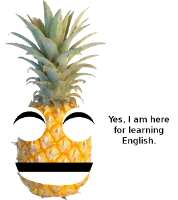
That should be “I am here to learn English.”
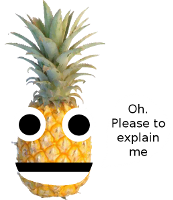
I think you mean “Please explain to me.”
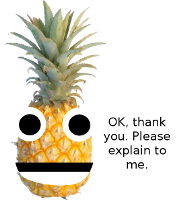
Well, you were explaining your reason for coming to the UK. In English, we explain our reasoning by saying I am [present continuous verb] to [verb].
For example:
- “I am reading to learn.”
- “I am running to catch up.”
We would not say “I am running for catching up”.

So, Paul, how has your week been?
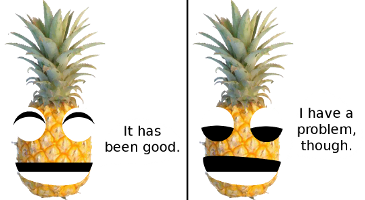
Oh yes? And what is that?
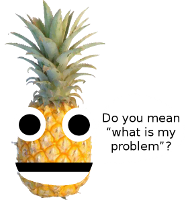
Yes, “that” can be used in a similar way to “it” to refer back to a previous subject, such as your problem.

Well, I’m not the best person to ask for romantic advice, but I can certainly help you ask him out with good English. Tell me what you are going to say to this fruit.
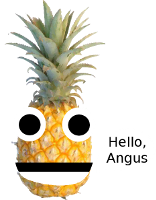
Good so far.

Hmmm, well, what you want to say is understandable, but there are a couple of grammatical errors and the second sentence would be phrased differently by a native speaker.
I’ll deal with the second sentence first. A native speaker would be more likely to say “Would you like to come to dinner with me?” This allows Angus to answer a question, rather than be faced with a statement of fact that needs no answer.
The first of the two errors I’ll deal with is where you said “for many times”. First, the word “for” doesn’t go with the phrase “many times”; “many times” just goes by itself.
- “I threw the ball many times.”
However, you are talking about two types of event (hanging out and talking) that occurred on more than one occasion. English has various words to cover this, for example: a lot, often, frequently.
So the difference can be characterised like so: When you play squash, you hit a ball against a wall many times. If you play squash each week, then you play it frequently.
The final thing I would change is the tense of your opening sentence. “We are hanging out and talking” means that that is what is currently going on, but “many times” means that this is something that has happened before. What you want to indicate is that hanging out and talking have happened in the past, and each time is complete, i.e. not still ongoing. For this, English has a tense called the present perfect.
Examples include:
- “I have been to the doctor.”
- “We have gone on holiday.”
- “They have eaten us out of house and home.”
To form the present perfect you take have and add the past tense of the verb. So in your sentence you want to say, “We have hung out and talked“.
So Paul, what are you going to say to Angus?
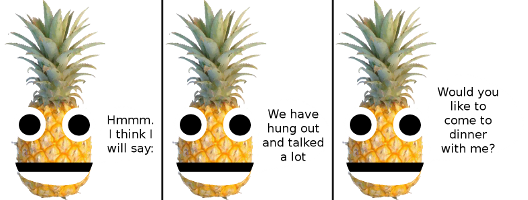
Excellent. To make it clear that you enjoy Angus’s company, you could add “, which I enjoyed very much.” to the end of the first sentence. So it would become “We have hung out and talked a lot, which I enjoyed very much.” This would emphasise how you feel about Angus, and hopefully persuade him to say yes!

No problem. Go get him!
